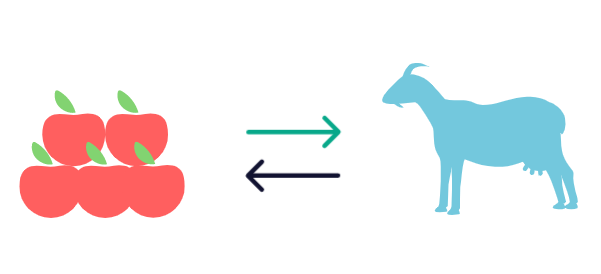
A trade refers to the exchange of goods, services, or assets between parties, typically involving a buyer and a seller. This fundamental economic activity is driven by the need to acquire something that one party lacks while offering something of value in return. Individuals and businesses engage in trade for various reasons, such as accessing resources, maximizing profits, diversifying offerings, and promoting economic growth.
In this article, we will delve into the intricacies of trade before exploring a specific area, such as financial trading.
1. What Is A Trade?
Trade can take many forms, but it fundamentally involves a voluntary exchange of goods and services between two entities, such as consumers or companies.
Historically, before modern fiat currencies like coins and paper bills came into circulation, barter trading was the norm. Barter refers to the act of trading goods or services between two or more parties without the use of money.

e.g. Adam proposed a trade to Mary; 5 of his apples for 1 of Mary’s sheep
However there are limitations of this system, primarily that there is no standardised measure of value. If there isn’t a “need” for the product or service, no trade will happen. Currency systems were developed to address this issue.
Most countries now use a monetary currency system with fiat currencies backed by the issuing governments, and are subject to theft and devaluation from inflation. In financial markets, trading refers to the buying and selling of securities, commodities or derivatives which we will look into.
2. Who Trades?
Participants in the financial markets include:
Speculators or retail traders: Individuals like you and me.
Institutional traders: Entities such as insurance companies and private funds.
Central Banks: Organizations like the U.S. Federal Reserve (Fed), Bank of Japan (BOJ), and European Central Bank (ECB).
Corporations: Multinational companies (MNCs).
Governments: National entities engaged in trading activities.
This diverse group of participants plays a vital role in shaping the dynamics of financial markets.
3. Why Trade? The importance of trading
One of the most common reasons for trading in the financial markets is to counter inflation.
Let’s consider this: if you put all your money under your bed for safekeeping and left it there for a year, the amount of money would not have increased. You would find exactly the same amount as you originally placed there.
However, aside from physical deterioration, that money would, in fact, be worth less than it was the previous year due to inflation and the rising cost of living.
This is where trading comes into play. Instead of allowing your money to lose value over time due to inactivity, you can convert it into shares or commodities that have the potential to appreciate in value. Of course, there's always the risk of losing value as well.
It is critical to find a balance between risk and potential rewards when trading in the financial markets. There is no hard and fast rule for achieving the perfect balance, but if approached modestly, the rewards could be significantly greater than simply having your money sitting in the bank—or even under your bed.
4. Summary
After exploring trades and the motivations behind them, you may be more cautious about areas closely related to financial trading, which can provide significant opportunities for profit. To engage effectively in trade, individuals should educate themselves on key concepts, start with small investments to minimize risk, and diversify their portfolios to reduce exposure. Staying informed about market trends and economic news is crucial, as is setting clear goals for trading activities.
Before making any trading decisions, it is important to equip yourself with sufficient fundamental knowledge, have a comprehensive understanding of market trends, be aware of risks and hidden costs, carefully consider investment targets, level of experience, risk appetite, and seek professional advice if necessary.
Furthermore, the content of this article is solely the author's personal opinion and does not necessarily constitute investment advice. The content of this article is for reference purposes only, and readers should not use this article as a basis for any investment decisions.
Investors should not rely on this information as a substitute for independent judgment or make decisions solely based on this information. It does not constitute any trading activity and does not guarantee any profits in trading.
If you have any inquiries regarding the data, information, or content related to Mitrade in this article, please contact us via email: insights@mitrade.com. The Mitrade team will carefully review the content to continue improving the quality of the article.












